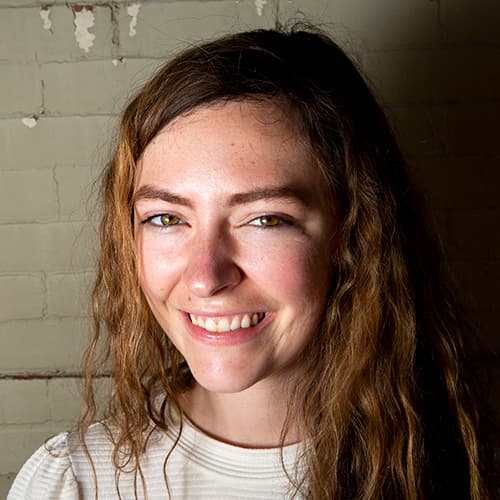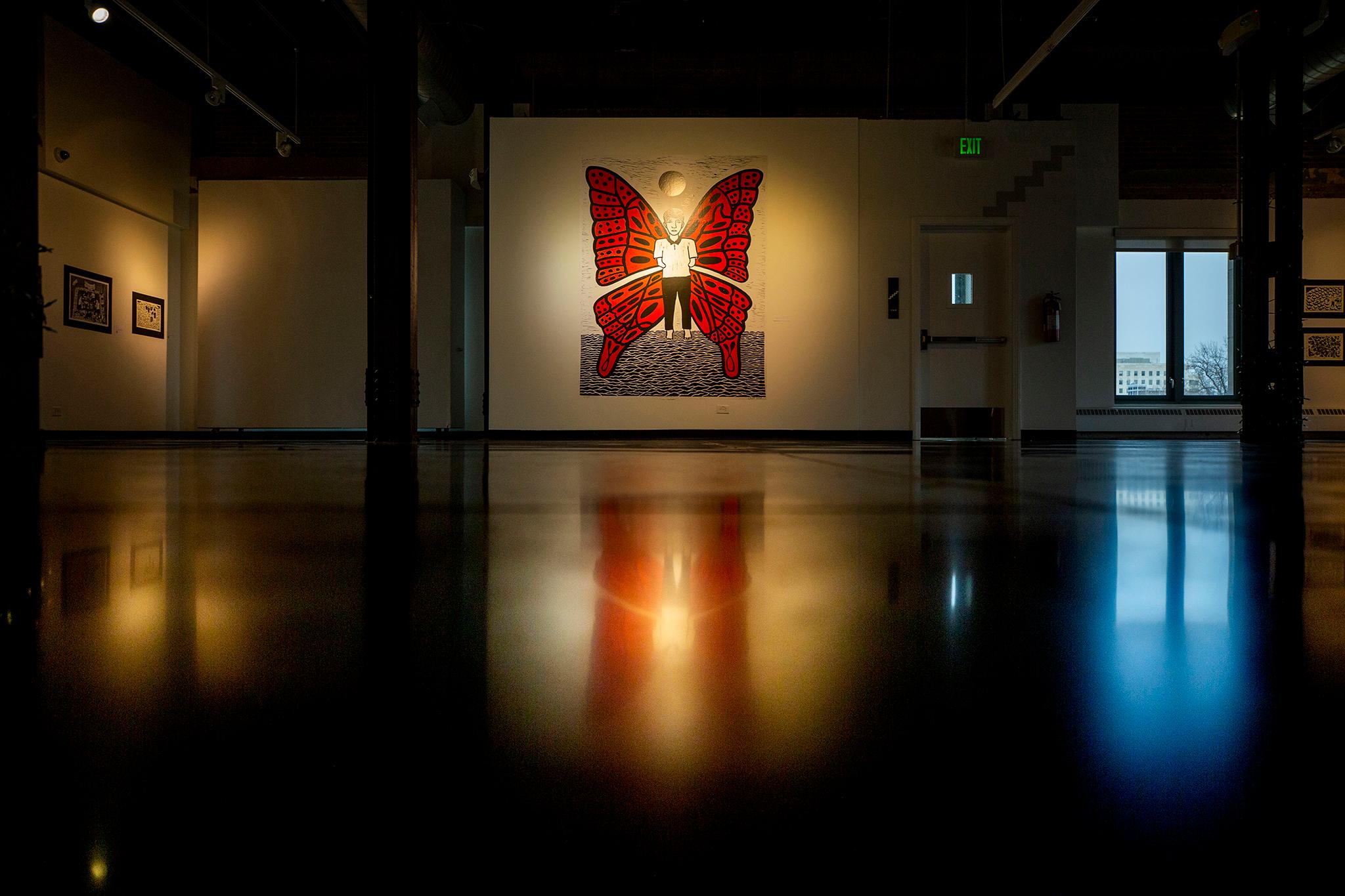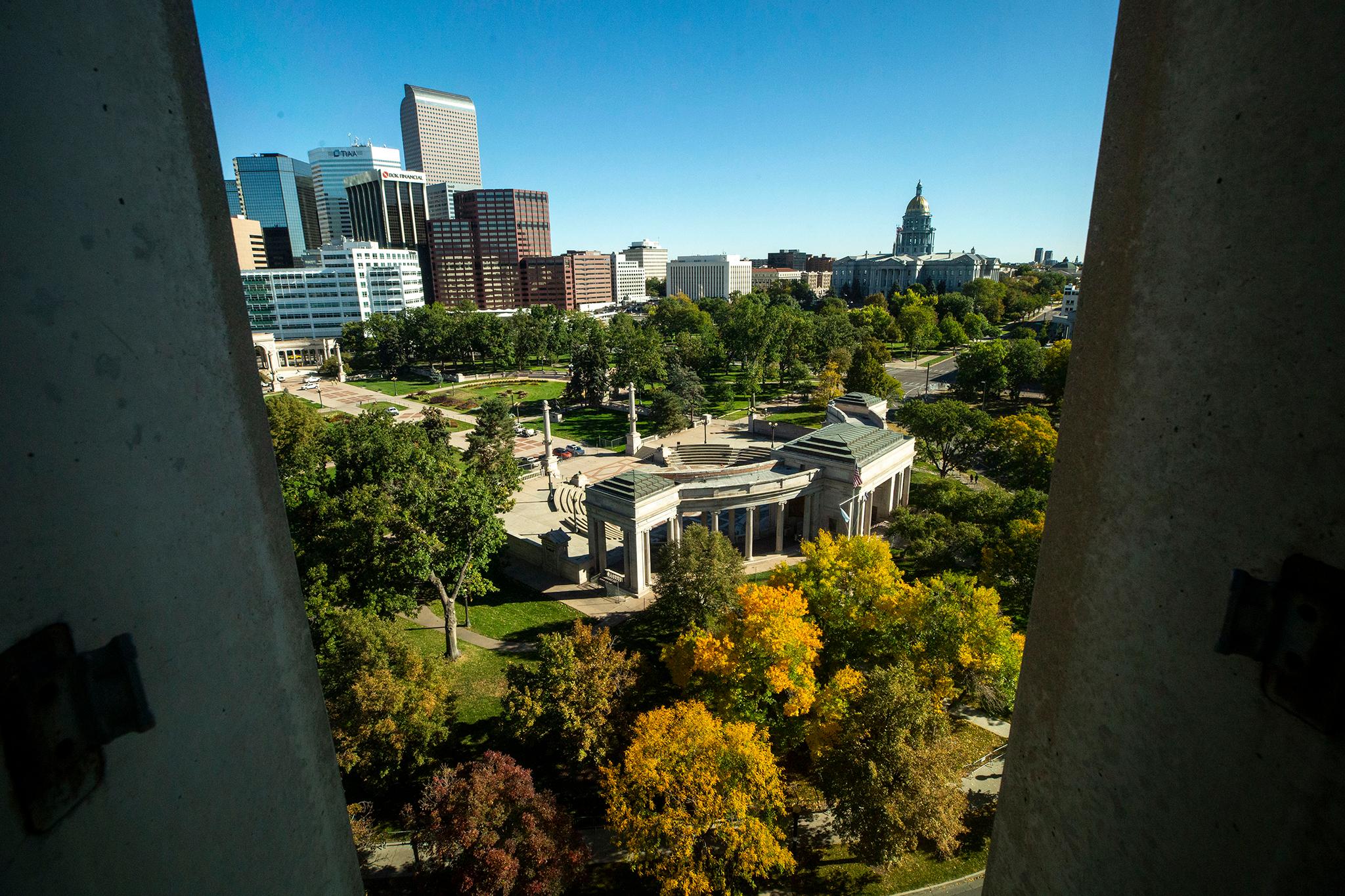In the center of the city, a new art show aims to project a message of optimism in difficult times.
Curated by Shanna Shelby, a Program Administrator for Denver Arts & Venues, Tomorrow is a New Day is one of the latest art exhibitions at the McNichols Center in Civic Center, a City-operated arts and culture hub. The gallery features block printed works by Cambodian artist Morn Chear and paper cut art by Seattle-based artist Lauren Iida, all displayed around the museum's lofty third floor exhibit space.
The exhibit's theme comes from a popular Cambodian proverb: "Tomorrow is a new day" -- a message of perseverance in the face of adversity, and optimism for the future. For both Morn and Iida, art has been a way to heal and grow.
Art represents a chance for a better life after a tragic accident for Morn, and a tool for challenging the stigma of disability. Iida's work is an investigation of the lives of her ancestors who were incarcerated in the Japanese internment camps during WWII, and a process of healing from intergenerational trauma.
"The connection between me and Chear and the theme is about, how do we get through times of adversity, and what kind of attitudes do we want to have, or strive to have, during times of adversity?" Iida said. "How can we lift each other up and use the power of our minds and our attitudes to continue to drive, even when we're being oppressed, or when a terrible accident happens to us, or when our lives are turned upside down for any reason?"
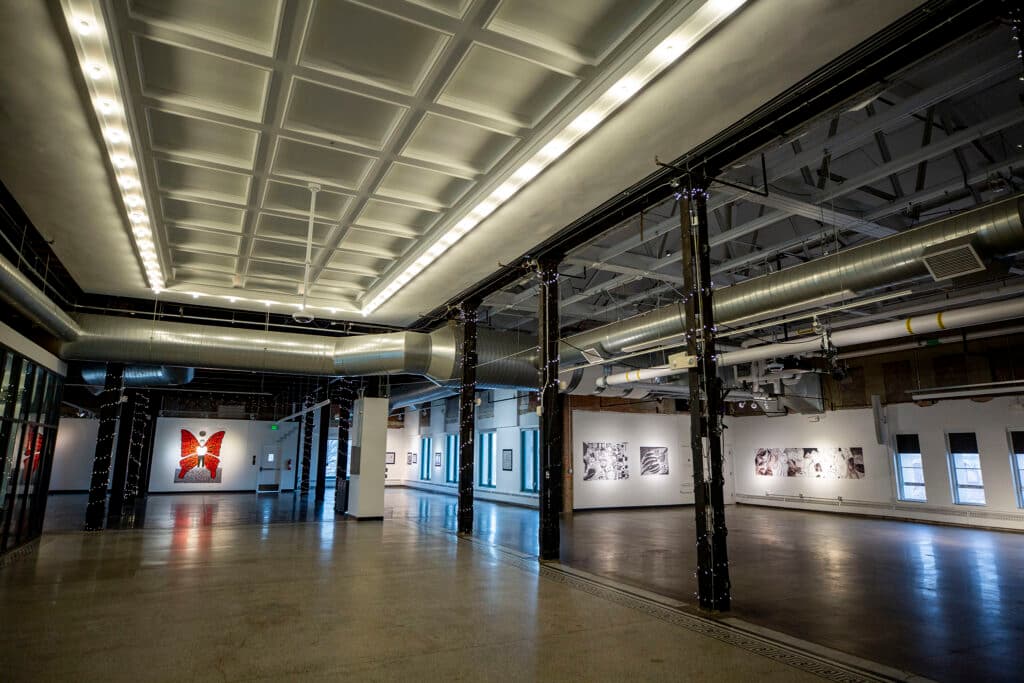
On one side of the gallery, the walls are lined with neat, precise and intricate narrative depictions of Morn's life in black and white ink.
Morn is color blind, Iida explained, so only a couple of his pieces incorporate color, which Morn's wife helped him add. One of these is an eye-catching self portrait in the center of the room: Morn after his accident, which cost him his forearms, framed by a pair of blazing scarlet butterfly wings.
The piece, "Metamorphosis: Red," is about Morn's transformation as a person. Morn grew up in a village in Cambodia. His family didn't have money to keep him in school, and he dropped out at a young age to work in construction.
When Morn was about 20 years old, he accidentally crossed two wrong wires and fell off the roof of the building he was working on. The electric shock accident caused severe burning and, eventually, the amputation of both arms up to his elbows. That accident, though traumatic, was what eventually led him to become an artist.
"He says that he lost both of his arms during that accident, but he gained a pair of wings through art," Iida said.
Morn lives in Cambodia and was not present for this interview. He does not speak English, so Iida, who mentors him through her Open Studio Cambodia collective, often acts as his translator and spokesperson. This is his story, as told to us by Iida.
After Morn was injured, his friends abandoned him. Where Morn grew up, Iida explained, having a physical disability can mean being rejected from society.
"People in Cambodia look down on him," Iida said. "There's a really serious stigma against people with disabilities. He was told many times when he first lost his arms that he would never amount to anything. He would never get married, he would never have a job, he would never earn income. He would always be a burden to his family."
Most disabled people you see in Cambodia, she said, are "begging for money in the street." Even now that Morn is a successful artist, Iida said, people still come up and hand him money, assuming because of his arms that he's a beggar.
When Morn first had his accident, he was very depressed.
"He had to learn how to feed himself. He had to learn how to dress himself and bathe himself. And he felt useless. And he felt guilty because his family is so poor, and they barely could afford to feed him and now he's a burden to them instead of being another source of income for them. He was very, very upset for a few years."
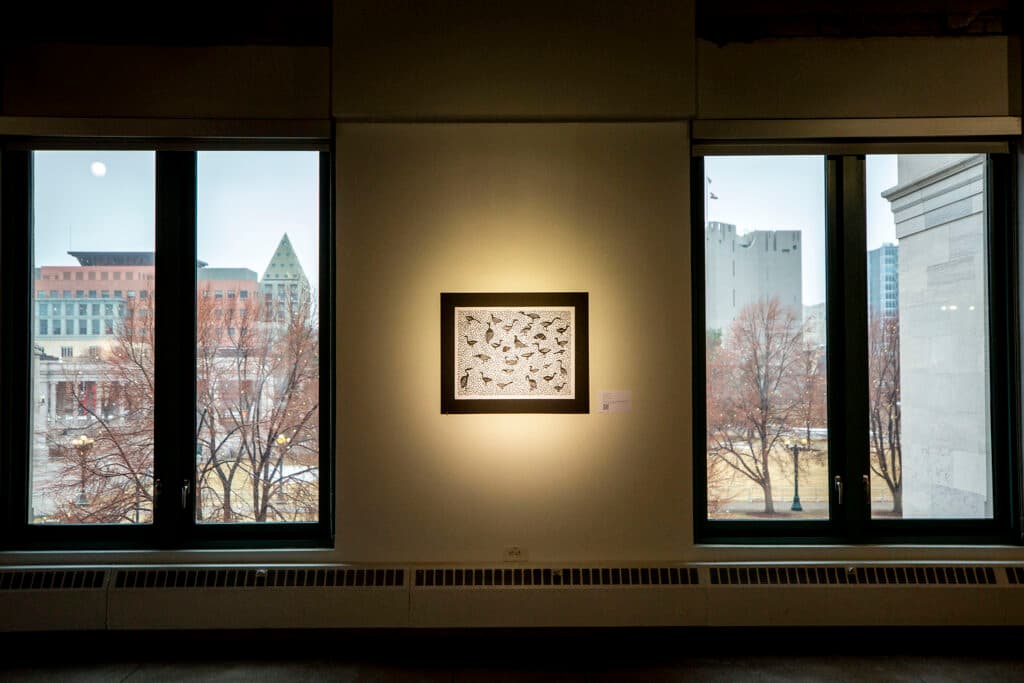
There happened to be a nonprofit in his remote village called Epic Arts, which works with disabled youth, primarily teaching them contemporary dance. Some representatives for the group asked Morn's family if they knew anyone with a disability who might want to participate.
"And they were like, well, here's Chear," Iida said.
He studied for a few years as a contemporary dancer. In 2018, Iida was working in Kampot, hosting open studios for artists. Because many elder artists had been killed in the Khmer Rouge genocide of 1975 to 1979, knowledge about the arts hadn't been handed down to the next generation. Iida was working to fill that gap by connecting artists with resources, supplies and opportunities, as well as teaching them the ins and outs of the business of art.
"There's this really interesting new growth of creative people that's just coming out of nothing,' Iida said. "It is so fascinating because they don't have any mentors, they don't have very many institutions and don't really have a Cambodian art generation as a jumping off point like we do here."
One of Morn's friends, another artist with a disability, brought him to one of those studio sessions and introduced him to Iida. Morn quickly took to block printing. Now, he draws and designs his pieces, and carves his blocks by holding a chisel between his elbows.
Now, Morn is living a life he was once convinced he could never have. He's married. His wife, who has one functional arm, helps him print everything. He's making money from art. He bought some land. He has his own studio. He drives a motorcycle.
Many of Morn's works are narrative depictions of memories from his life. One piece, for example, shows him standing among a flock of ducks, resting under some palms. It tells the story of his first job since his accident. An uncle had given him a job tending ducks. He herded a flock of thousands of them, walking outside for weeks at a time, carrying all of his food and supplies.
"The job's super hard because they don't ever go home," Iida said. "The ducks never stop right? So they're just walking herding these ducks through the countryside of Cambodia. There's mosquitoes, but he can't slap them, so all night long he's getting eaten by mosquitoes."
Still, he was earning an income again. The piece is called Sometimes Happy, Sometimes Difficult.
"It was a really, really, really difficult job. But he was so happy for the opportunity that he did it really happily," Iida said.
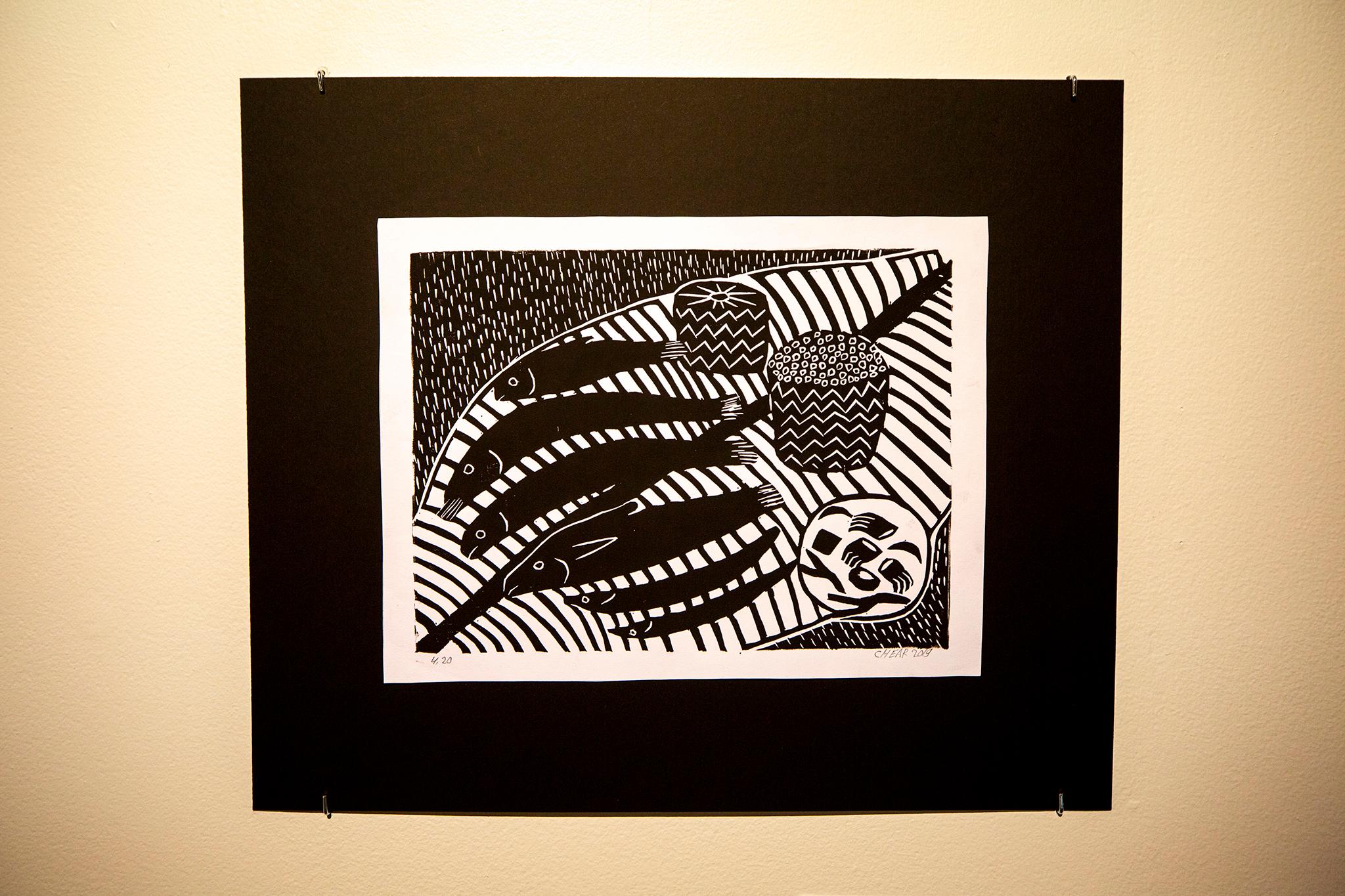
Another piece called Warmth depicts Morn as a child with his mother and sister. They're huddled together for warmth at a campsite. Iida said that after the Khmer Rouge genocide, so many people had been killed that "it was kind of a free for all with the land."
"If you weren't physically occupying the land that your family owned before the Khmer Rouge, you didn't really have the right to it anymore," Iida said.
Morn's family had owned land in the countryside, so he, his dad, his young sister and his mom had to camp out there to retain it. Iida said "Warmth" is based on a memory from that time, in which his dad was out getting charcoal one night during a storm.
"It was scary and ghostly," Iida said. "These are bones of people who were murdered during the genocide in the background."
His mom had held Morn and his sister close, keeping them warm. Though it was a harrowing experience, that's the prevailing impression: "Warmth."
"All of his work is about optimism," Iida said. "Even when you see dead people's skulls and bones, it's still about warmth. He's very, very relentlessly optimistic."
Iida is half Japanese. Much of her work deals with Japanese American history.
She works with historical photos from her own family archives, as well as from Densho, an online digital archive that works to preserve the history of Japanese incarceration during WWII.
Because of the trauma of the experience of incarceration, most of Iida's family members did not pass down their Japanese culture.
"I was never taught anything about my Japanese heritage. I don't speak the language. And I've never been to Japan. I was just in the dark about that side of my heritage for a really long time," Iida said. "My specific personal goal has been to learn about the experiences of my ancestors through my art making"
She digs through Densho's archives, attempting to figure out where she came from. Her side of the exhibition, and much of her art career, is about bringing the stories that emerge from her research to life.
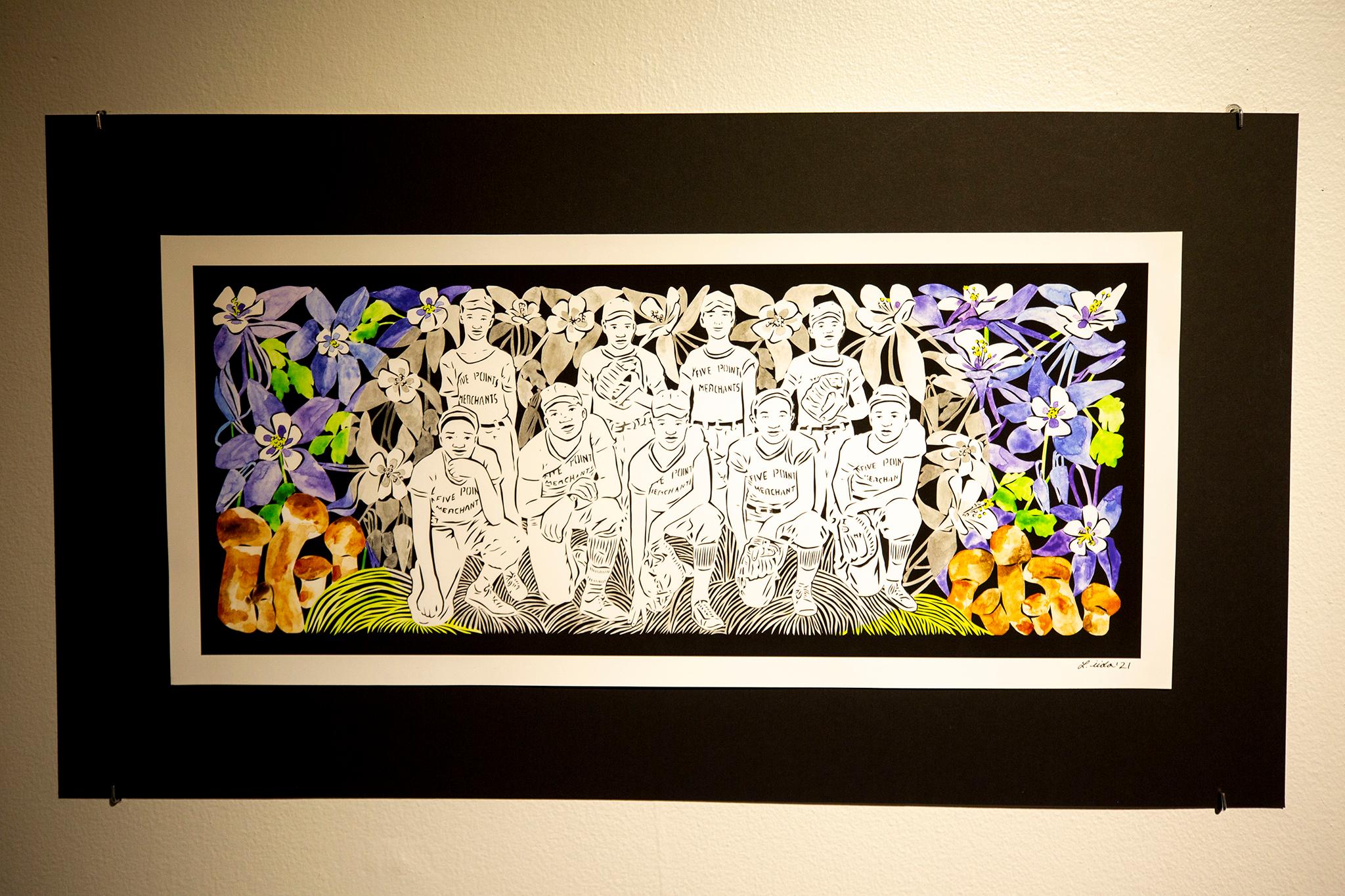
"I'm really fascinated by ways that people bettered themselves or tried to maintain some kind of higher mortality, or self improvement, while they were incarcerated," she said. "A lot of people made arts and crafts. A lot of people learned new skills. A lot of people figured out ways to have collective recreational activities."
Those incarcerated in the camps weren't allowed to take much with them from home. They had to invent their own recreation with what little they had to work with.
"My great grandma made these little pins -- and a lot of people did at camp -- from the shells that they sifted from the desert sand," Iida said. "Those are some of the most popular art artifacts that's remained from camp. And little carved wooden birds was another thing that they used as pins."
Her grandmother Clara, who's now 102 years old now, worked at a camp rec center to organize dances and clubs and other activities to lift people's spirits.
"That's the kind of optimism that I don't do very well," Iida said.
Iida's pieces, displayed on one side of the gallery, are images carved out of single sheets of paper, the semblance of light and shadow and form created by cutting out intricate lines and shapes. Some of Iida's pieces depict scenes of life in the camps, and some are based on photos Iida's grandfather kept over the decades.
One shows a group of boys playing Rock, Paper, Scissors. Another, "The Adventure of the Incarcerated," shows a group of children hiking up a snowy hill, a sled in tow. Towards the end of the war, at the camp where Iida's grandparents lived, the guards allowed children past the camp gates to hang out on a nearby mountain. That mountain became a popular date spot for young couples, including Iida's own grandparents.
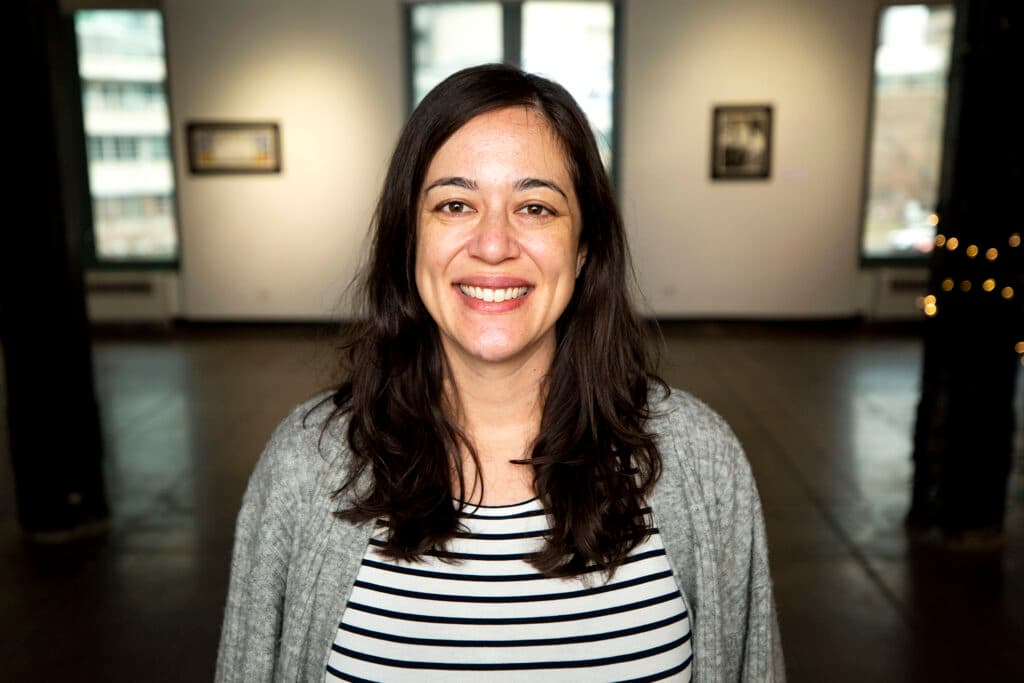
Another piece depicts a flock of paper cranes -- a symbol of hope in Japanese culture -- flying together in one unified circle.
"Their optimism and their hope inspires me to have optimism and hope now in this difficult period in our history," Iida said. In her research, she's noticed a lot of connections between the incarceration of Japanese Americans and the experience of living through a pandemic.
"The isolation, and the feelings of stuckness, and uncertainty, and anxiety about the future," she said. "Not being able to access things and people that you normally can, and not having freedom of movement."
The central theme of the exhibit -- that "tomorrow is a new day" -- is something that does not come easily for Iida. It's something she admires in Morn, and in the people she's learned about through her archival research. It's a mantra she says can be applied today, as we face a global pandemic and other challenges.
"I just think that the power of the mind and the power of attitude is really, really important," Iida said. "And it's something that I struggled with, and something that everyone I know struggles with at some point. But my ancestors who were incarcerated, Chear just being the fabulous human being that he is, really inspire me to try to try to keep hope and optimism every day."
"Tomorrow is a New Day" runs from January 1-May 1, 2022 on the third floor of the McNichols Civic Center Building. The exhibition is open daily from 8 a.m. to 5 p.m.. It is free to attend.
